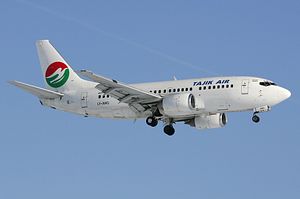On January 21, Tajik President Emomali Rahmon tossed the head of Tajik Air, the country’s national airline, out of a government meeting. According to RFE/RL, after hearing a report from Khairullo Rahimov the Tajik president criticized him and then told him to leave (along with the chief executive of the state bank Amonatbank, Ruhullo Hakimzoda, who similarly delivered a report and then was told to leave).
Later the same day, Dushanbe issued a decree appointing Dilshod Ismatullozoda, previously deputy head of the President’s Executive Office, to lead beleaguered Tajik Air. Ismatullozoda reportedly has no experience running an airline or even working for one.
Tajik Air began life as a division of the Soviet Union’s Aeroflot. The construction of an international airport in Dushanbe in 1930 marked the beginning of operations, according to Tajik Air’s website. In 1991, with Tajikistan’s independence, it became Tajikistan’s national carrier. As of April 2018, Tajik Air flew routes to India, Iran, Kazakhstan, Kyrgyzstan, several Russian cities including Moscow and St. Petersburg, as well as domestically from its hub in Dushanbe to Khujand.
While there are a handful of small local airlines, Tajik Air’s biggest competition formed up in the 2008 launch of Somon Air, branded as a privately owned airline. It rapidly began expanding its route offerings and Tajik Air’s days seemed numbered.
As 2009 U.S. diplomatic cable leaked by Wikileaks, however, stated matter-of-factly what many regional analysts believed: That Somon Air was controlled by the president and his family.
The cable, an analysis of a then-recent agreement between Boeing and Somon Air, stated that “Somon Air is owned by OrionBank, controlled by the President and run by his brother-in-law. Somon Capital, half-owned by OrionBank, is contracted to handle all financial dealing for new aircraft for Somon Air, while the air company only operates the aircraft.”
Later in the cable, the author writes: “The President and his close associates control Somon Air but, as [Jamshed] Rahmonberdiev [the CEO of Somon Capital] has told us, the money to buy the airplanes comes from the financially opaque and ostensibly state-owned Tajik Aluminum Company.”
The Tajik Aluminium Company (Talco), which operates Tajikistan’s largest aluminium processing plant, is reportedly also controlled by Rahmon and his family. According to a 2013 piece in The Economist, “Each year, TALCO produces hundreds of millions of dollars in profits that are routed to a shell company in the British Virgin Islands.” Another leaked cable suggested that while “technically state-owned” Talco’s revenue ended up in an offshore account controlled by the president.
Back to Tajik Air: In early January 2019, Tajik Air halted all scheduled flights due to a reported dispute with its fuel supplier TZK. This was not the first such dispute. In May 2017, for example, Tajik Air had a payment dispute with TZK, which holds a monopoly on aviation fuel sales in Tajikistan. TZK, according to Eurasianet, “belongs” to Hasan Asadullozoda — the same Asadullozoda profiled in another leaked 2008 cable. The cable notes that through his Ismoili Somoni Financial and Industrial Group, “Asadullozoda is widely believed to control a significant portion of Tajikistan’s economy,” including interests in OrienBank, Somon Capital, and “full ownership of Somon Air.”
Somon Air is the main beneficiary of Tajik Air’s troubles, taking over its flight routes to Russia.
Tajik Air’s new head, Ismatullozoda, is reportedly the brother of the deputy chairman of Asadullozoda’s OrionBank, according to Eurasianet; meanwhile, a Tajik opposition website claims that Ismatullozoda’s sister is married to Asadullozoda.
This series of events is a prime example of the Tajik nepotocracy at work. As described by Edward Lemon, the DMGS-Kennan Institute Fellow at the Daniel Morgan Graduate School, in an interview with The Diplomat last month, “Tajikistan is a nepotocracy; a kleptocratic system based on nepotism. Rahmon’s family have grown rich through this system and they will seek to maintain it.”
A private airline rising to compete with a state-owned carrier is a free market dream concocted to make Tajikistan look like a country an investor may risk a bet on. But a peek behind the curtain reveals a puppet show controlled by the ruling family.

































